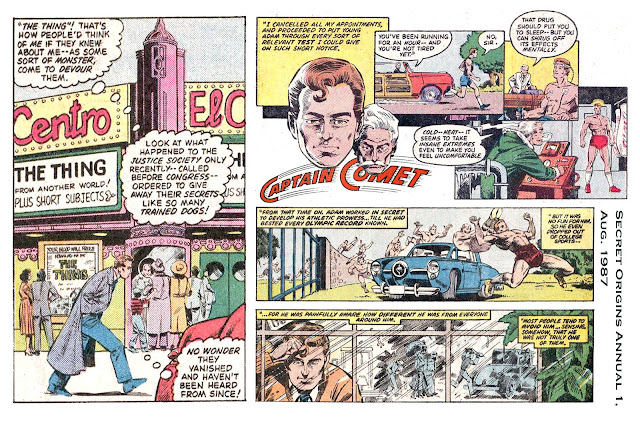April 1952: The Greed of the Gods
This month’s adventure reaches back
to “long, long ago,” when Zus, Merkry, Hurkles, and other Olympian rulers left
Earth in a “sky vessel,” traveling in suspended animation and awakening one at
a time, at half-century intervals, to search for true immortality.
“Someday ... somewhere in the
universe, the secret of immortality will be discovered!,” says Zus. By
extending their lives indefinitely through hibernation, these proto-gods intend
to acquire it.
Encountering their ship in Strange Adventures 19 (April 1952),
Captain Comet finds Merkry, in his winged helmet, testing an alien scientist’s
claim of immortality by killing him with a “letho-ray.”
Oh well. Back to the drawing
board, as they say.
In a space chase, Comet radios to
demand that the murderous would-be deities surrender to face justice, but they
only laugh at him.
“He wants to put Zus on trial!,”
the leader says. “Stand aside — while I destroy that young meddler with my own
special brand of death.”
Dodging Zus’s thunderbolt with the
faster-than-light drive of his Cometeer, the mutant superhero puts an end to
the false gods by maneuvering them into a deadly meteor belt,
“It’s my life or theirs now — and
I have only one weapon — my brain!” he thinks.
The story Secret of the Twelve Eternals reiterated the themes of finding
rational explanations for myth and relying on your intelligence in a crisis.
The ancient astronauts/Greek gods
plot idea worked so well that it was recycled at least twice in the Silver Age
— for both Adam Strange (Chariot in the
Sky, Mystery in Space 58, March 1960) and the Flash (The Men Who Claimed the Earth, The Flash 113, June-July 1960). The
same plot would form the basis for Who
Mourns for Adonais?, a second
season episode of Star Trek, which
aired Sept. 22, 1967.
Captain Comet’s stories, like the
slightly later Adam Strange stories, underlined the point that you should try
to reason your way out of dilemmas, no matter how difficult. That should go
without saying, but many things that should go without saying apparently must
be said repeatedly in 21st century America.
As the Yale philosophy professor
Brand Blanshard wrote, “Science … means more than a set of conclusions; it
means also a set of methods and intellectual habits. The most important of
these habits is adherence to a rule that is felt to be at once intellectual and
moral, the rule of adjusting one’s assent
to the evidence.”
That obvious principle — that
reality requires you to accept the plain, verified evidence before you, not try
to hide it or pervert it — was once taken for granted by all even minimally
educated children in this nation. Now millions of Americans willfully ignore it,
to our great shame and peril.
Because intellectual honesty is
not merely admirable. It’s a necessary precondition that permits civilization
to survive.





Demostenes Menezes Ramos:
ReplyDeleteI find the plot fantastic. A great change from those bugged eyes monsters.
Michael Fraley:
ReplyDeleteOf course, hibernating your way into immortality like that was the tried-and-true method of pulp hero 'Anton York, Immortal,' by Eando (Earl and Otto) Binder. I wonder how odd it felt to see all of your old concepts from the pulps trotted out onto the comic page by younger writers ... and occasionally, by, yourself?
I replied:
I always think about Richard Matheson's bittersweet bemusement when he saw his "I Am Legend" concept being recycled as "Night of the Living Dead" and then the flood of zombie apocalypse stuff we have today. He'd have preferred to be paid for it, I'm sure.
Michael Fraley:
ReplyDeleteDan Hagen Oh gosh, I'm not sure if I do agree. Here, money! But yes ... Binder, Hamilton, and others lived long enough for their plots to become tropes. Edmond Hamilton absolutely deserved a Star Trek credit as co-creator. All of those Federation stories in the late 1920s didn't' write themselves.
I replied:
I'd say Van Vogt is at least equally responsible for Star Trek, and probably more so. This just illustrates how concepts evolve in culture. Was Superman ripped off from Philip Wylie? Yes. Was Superman nevertheless original? Yes.
Bob Bailey:
ReplyDeleteGood story as are all the Captain Comets! We need to get them back into print!
Bob Bailey:
ReplyDeleteExcellent series. I so wish they would do an archive or collection of these stories.
Kim Bené:
ReplyDeleteWell said!
Robert Griffith:
ReplyDeleteI really wish DC had published the omnibus of Captain Comet.